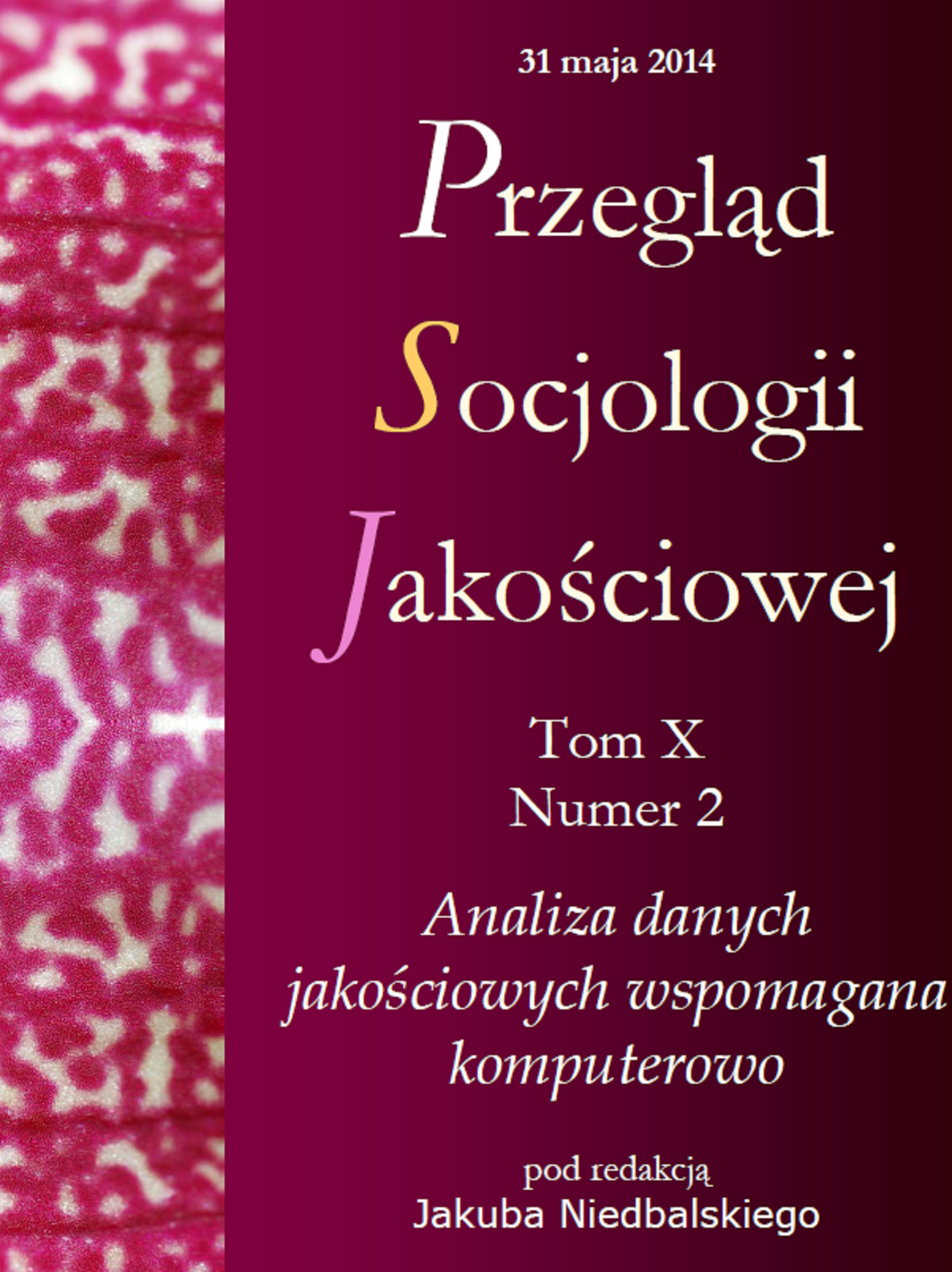Autoethnography, Storytelling, and Life as Lived: A Conversation Between Marcin Kafar and Carolyn Ellis
DOI:
https://doi.org/10.18778/1733-8069.10.3.06Słowa kluczowe:
Autoethnography, Storytelling, Personal Narrative, Scientific Auto/Biographies, Ethos, Carolyn EllisAbstrakt
This conversation takes place in Warsaw. Carolyn Ellis has come to Poland to accompany Jerry Rawicki, a Warsaw Ghetto survivor, on his first trip back to Poland since the Holocaust. There she arranged to meet Marcin Kafar, a scholar in Poland who has spent time with her at the University of South Florida in Tampa, Florida. During this visit, Marcin assists Carolyn with video recording Jerry’s experiences as they visit Holocaust sites, and Jerry remembers and reflects on his experience. Afterwards, Marcin converses with Carolyn about autoethnography, storytelling, and the importance of life in the context of searching for ethos by academics.
Pobrania
Bibliografia
Bochner, Arthur P. 1997. “It’s About Time: Narrative and the Divided Self.” Qualitative Inquiry 4:418–438.
Google Scholar
DOI: https://doi.org/10.1177/107780049700300404
Bochner, Arthur P. 2009. “Communication’s Calling: The Importance of What We Care About.” Presidential Address, National Communication Association, November 23, 2008, Chicago. Spectra 45:14–29.
Google Scholar
Chang, Heewon, Faith Wambura Ngunjiri, and Kathy Ann Hernandez. 2013. Collaborative Autoethnography. Walnut Creek: AltaMira Press.
Google Scholar
Diversi, Marcelo and Claudio Moreira, C. 2009. Betweener Talk: Decolonizing Knowledge Production, Pedagogy, and Praxis. Walnut Creek: Left Coast Press.
Google Scholar
Ellis, Carolyn. 1995. Final Negotiations: A Story of Love, Loss, and Chronic Illness. Philadelphia: Temple University Press.
Google Scholar
Ellis, Carolyn. 2004. The Ethnographic I: A Methodological Novel About Autoethnography. Walnut Creek: AltaMira Press.
Google Scholar
Ellis, Carolyn. 2009. Revision: Autoethnographic Reflections on Life and Work. Walnut Creek: Left Coast Press.
Google Scholar
Ellis, Carolyn. 2011. “Jumping On and Off the Runaway Train of Success: Stress and Committed Intensity in an Academic Life.” Symbolic Interaction 34(2):158–172.
Google Scholar
DOI: https://doi.org/10.1525/si.2011.34.2.158
Ellis, Carolyn. 2012. “The Procrastinating Autoethnographer: Reflections of Self on the Blank Screen.” The International Review of Qualitative Research 5(3):331–337.
Google Scholar
DOI: https://doi.org/10.1525/irqr.2012.5.3.333
Ellis, Carolyn. 2014. “No Longer Hip: Losing My Balance and Adapting to What Ails Me.” Qualitative Research in Sport, Exercise and Health 6(1):1–19.
Google Scholar
DOI: https://doi.org/10.1080/2159676X.2014.880505
Ellis, Carolyn and Chris Patti. in press. “With Heart: Compassionate Interviewing and Storytelling With Holocaust Survivors.” Storytelling, Self, Society.
Google Scholar
Ellis, Carolyn and Jerry Rawicki. 2013. “Collaborative Witnessing of Survival During the Holocaust: An Exemplar of Relational Autoethnography.” Qualitative Inquiry 19:366–380.
Google Scholar
DOI: https://doi.org/10.1177/1077800413479562
Ellis, Carolyn and Jerry Rawicki. 2014. “More than Mazel? Luck and Agency in Surviving the Holocaust.” Journal of Loss and Trauma: International Perspectives on Stress & Coping 19:99–120.
Google Scholar
DOI: https://doi.org/10.1080/15325024.2012.738574
Ellis, Carolyn and Jerry Rawicki. in press. “Collaborative Witnessing and Sharing Authority in Conversations With Holocaust Survivors.” in Beyond Testimony and Trauma: Oral History in the Aftermath of Mass Violence, edited by Steven High. Vancouver: University of British Columbia Press.
Google Scholar
Ellis, Carolyn, Tony Adams, and Arthur P. Bochner. 2011. “Autoethnography: An Overview” [40 paragraphs]. Forum Qualitative Sozialforschung / Forum: Qualitative Social Research 12(1), art. 10. Retrieved July 10, 2014 http://nbn-resolving.de/urn:nbn:de:0114-fqs1101108
Google Scholar
Gale, Ken et al. 2012. How Writing Touches: An Intimate Scholarly Collaboration. Newcastle upon Tyne: Cambridge Scholars Publishing.
Google Scholar
Kafar, Marcin. 2011. “O współuczestnictwie i osobistym ethosie w kontekście Społeczności wiejskiej Kazimiery Zawistowicz- -Adamskiej [On Co-Participation and Personal Ethos in the Context of Peasant Community by Kazimiera Zawistowicz- -Adamska].” Pp. 175–190 in Wokół społeczności wiejskiej. Etnografia Kazimiery Zawistowicz-Adamskiej – kontynuacje i inspiracje [Around Peasant Community. Ethnography of Kazimiera Zawistowicz-Adamska – Continuations and Inspirations], edited by Grażyna E. Karpińska, Anna Styczyńska-Nadolska. Wroclaw, Lodz: Polskie Towarzystwo Ludoznawcze.
Google Scholar
Kafar, Marcin. 2013. “Biographical Epiphanies in the Context of Laying the Foundations of the Qualitative Thought Collective.” Pp. 43–74 in Scientific Biographies: Between the ‘Professional’ and ‘Non-Professional’ Dimensions of Humanistic Experiences, edited by Marcin Kafar. Lodz, Krakow: Lodz University Press, Jagiellonian University Press.
Google Scholar
DOI: https://doi.org/10.18778/7969-055-8.03
Kaniowska, Katarzyna. 2011. “Społeczność wiejska czytana dzisiaj [Peasant Community Read Today].” Pp. 117–130 in Wokół społeczności wiejskiej. Etnografia Kazimiery Zawistowicz-Adamskiej – kontynuacje i inspiracje [Around Peasant Community. Ethnography of Kazimiera Zawistowicz-Adamska – Continua tions and Inspirations], edited by Grażyna E. Karpińska, Anna Styczyńska-Nadolska. Wroclaw, Lodz: Polskie Towarzystwo Ludoznawcze.
Google Scholar
Norris, Joe, Richard Sawyer, and Darren Lund, (eds.). 2012. Duoethnography: Dialogic Methods for Social, Health, and Educational Research. Walnut Creek: Left Coast Press.
Google Scholar
Rambo (Ronai), Carol. 1995. “Multiple Reflections of Child Abuse: An Argument for a Layered Account.” Journal of Contemporary Ethnography 23:395–426.
Google Scholar
DOI: https://doi.org/10.1177/089124195023004001
Rawicki, Jerry and Carolyn Ellis. 2011. “Lechem Hara (Bad Bread) Lechem Tov (Good Bread): Survival and Sacrifice During the Holocaust.” Qualitative Inquiry 17:155–157.
Google Scholar
DOI: https://doi.org/10.1177/1077800410392337
Richardson, Laurel. 1994. “Writing: A Method of Inquiry.” Pp. 923–948 in Handbook of Qualitative Research, edited by Norman K. Denzin, Yvonna S. Lincoln. Thousand Oaks: Sage.
Google Scholar
Rose, Dan. 1990. Living the Ethnographic Life. Newbury Park: Sage.
Google Scholar
DOI: https://doi.org/10.4135/9781412984799
Sacks, Oliver. 1995. “Scotoma: Forgetting and Neglect in Science.” Pp. 141–187 in Hidden Histories of Science, edited by Robert B. Silvers. New York: New York Review of Books.
Google Scholar
Turner, Victor. 1978. Dramas, Fields, and Metaphors: Symbolic Action in Human Society. Ithaca, London: Cornel University Press.
Google Scholar
Zawistowicz-Adamska, Kazimiera. 1948. Społeczność wiejska [A Peasant Community]. Lodz: Polski Instytut Służby Społecznej.
Google Scholar
Pobrania
Opublikowane
Jak cytować
Numer
Dział
Licencja

Utwór dostępny jest na licencji Creative Commons Uznanie autorstwa – Użycie niekomercyjne – Bez utworów zależnych 4.0 Międzynarodowe.














